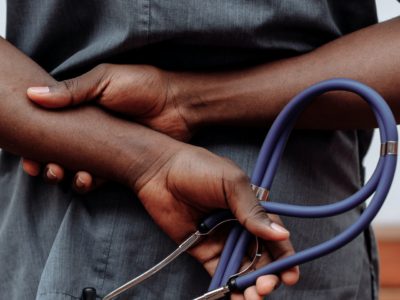Dale Weeks is being remembered as a “good neighbor” that would do almost anything for anyone. The Iowa native and retired school superintendent recently came down with sepsis just as the Omicron variant of the coronavirus was spreading across the state. His family thought he was going to get better before the holidays, but he couldn’t secure a bed at a local hospital. Now, his family is blaming the unvaccinated for hogging precious medical resources.
Access Denied
Weeks was being treated for sepsis at MercyOne, a small, rural hospital in Newton, Iowa, but the facility didn’t have the resources to treat his condition. He ended up waiting 15 days for a bed at a larger hospital due to the rise in the number of COVID-19 cases.
“It was terribly frustrating being told, ‘There’s not a bed yet,’” said Jenifer Owenson, one of Weeks’ four children. “All of us were talking multiple times a day, ‘Why can’t we get him a bed?’ There was this logjam to get him in anywhere.”
He finally went in for surgery two weeks after being diagnosed, but by that time his condition worsened. He died of complications during surgery at the age of 78.
Weeks was vaccinated and boosted, but his family says he is just another indirect victim of the pandemic. They believe that if more people in the U.S. were vaccinated when Omicron started spreading, their dad wouldn’t have had to wait so long to get a bed.
“The frustrating thing was not that we wanted him to get care that others weren’t getting, but that he didn’t get care when he needed it. And when he did get it, it was too late,” said Anthony Weeks, his son. “The question comes up of: ‘Who was in those beds?’ If it’s people who are unvaccinated with covid, then that’s the part where it really hurts.”
“The thing that bothers me the most is people’s selfish decision not to get vaccinated and the failure to see how this affects a greater group of people,” said Owenson. “That’s the part that’s really difficult to swallow.”
Marcy Peterson, a spokesperson for MercyOne, didn’t comment on the specifics of Weeks’ case, but expressed frustration with the number of unvaccinated COVID-19 patients in the area.
“In addition to an increased number of COVID-19 cases and spread of the delta and omicron variants, hospitals across the country are dealing with traumas and experiencing multiple types of illness,” Peterson said. “This demand is coupled with a reduced number of staff to care for patients. These challenges can strain available resources and contribute to delays in care or other complications for patients.”
Nearly 82% of hospitalized COVID-19 patients in Iowa are unvaccinated and more than 85% of COVID-19 patients in the state are unvaccinated, according to data from the Iowa Department of Public Health.
Weeks was an Iowa native who spent his life educating young people. He taught math and science before becoming a principal and superintendent at three different schools.
“Dad could have taken the easy route of saying, ‘I’ll just be a school administrator because it’s a job,’ but he truly believed his work was helping people who needed to learn,” Owenson said. “He believed education was what was going to help people get to the next place they need to be.”
He would do everything he could to help his local school district save money, including driving the bus. His daughter Julie Simanski said he once pulled over to help a church congregation on the side of the road.
“This whole church congregation ran over and said, ‘Hallelujah, the Lord has answered our prayers!’ He said, ‘How can I help?’” said Simanski. “He told them to get on the bus and he took them to where they needed to go. That was the epitome of who he was.”
Owenson said her dad followed the public health guidelines when the pandemic broke out in 2020. He was fully vaccinated and got boosted in October. She remembered calling Weeks after a friend told her they were having trouble getting their family members vaccinated.
“He said, ‘I don’t understand that, what is the reason for not getting vaccinated?’” Simanski said. “I told him how these people didn’t know what was in the vaccine. He said, ‘Well, we didn’t know what was in polio, either, but we got the shot.’”
His family became concerned after Weeks called them around Halloween to say he couldn’t make his granddaughter’s birthday because he was feeling unwell. He had just had his flu and booster shots, and his doctor assumed he was just feeling the side-effects.
“He said, ‘I shouldn’t be around if I don’t know what’s making me feel this way,’” Simanski said. “He went that extra mile to make sure he wasn’t going to infect anyone if he had COVID.”
Weeks went to the hospital on November 1 and was diagnosed with sepsis. While unrelated to COVID-19, sepsis is the body’s way of responding to infections. The CDC says one in three patients who die in the hospital have sepsis.
When his family decided to take him to the hospital in Centerville, Iowa, officials told them they didn’t have enough space. The next closest hospital with availability was in Illinois. Instead of leaving the state, they decided to keep him at MercyOne. While the staff did their best to treat his sepsis with antibiotics, his family asked them to send Weeks to a facility with more treatment options. But they were told their father’s condition wasn’t severe enough to warrant a transfer.
“He was languishing in the hospital bed without care,” said Anthony Weeks. “He was a fixer and liked to explore creative solutions to things. So, it was really baffling why he couldn’t fix this — or why no one could fix this.”
“The irony of it all is that someone who was committed to service and helping people his whole life ended up dying from people not being neighborly or helpful,” Simanski said.

















